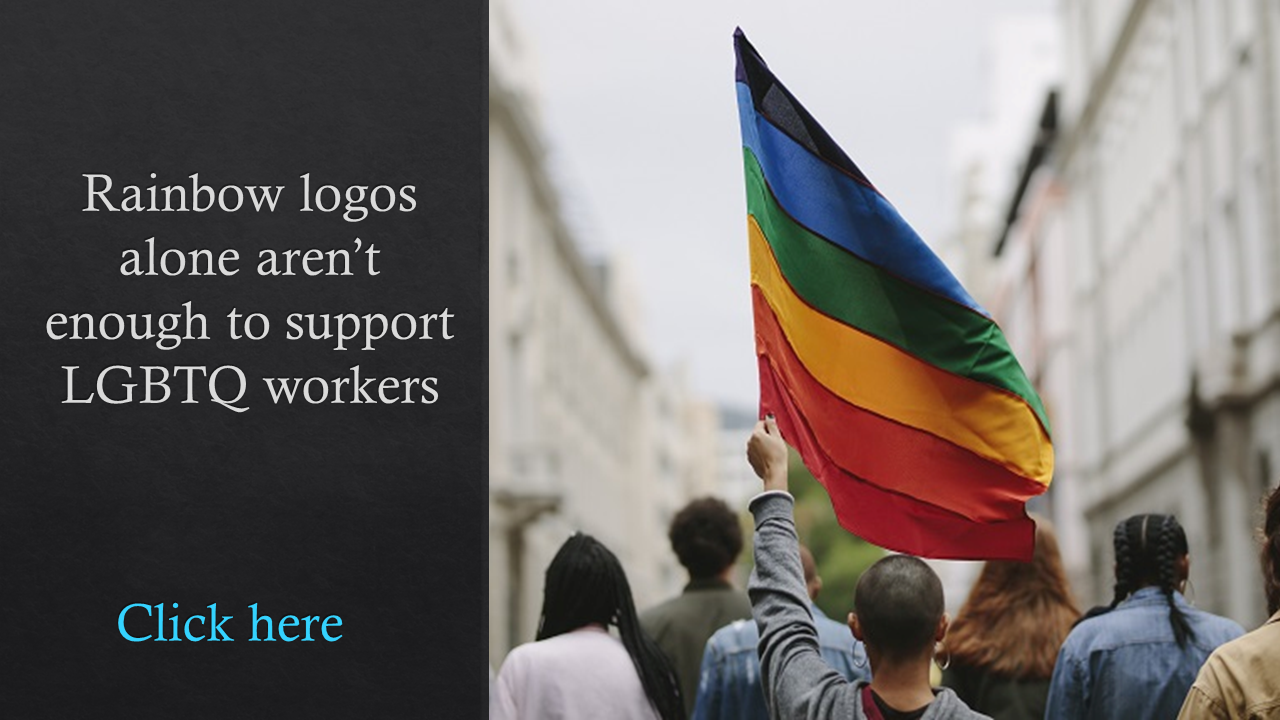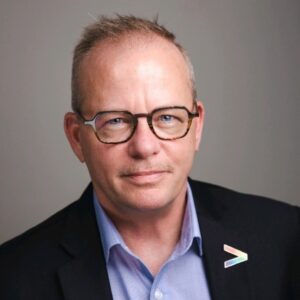A recent i4cp webinar to mark LGBTQ Pride Month kicked off with an energetic opening: Diana Ross’ “I’m Coming Out.” It was a song that had particular meaning to featured speaker Beck Bailey, managing director of inclusion & diversity at Accenture.
When Bailey was a college student in the South in the early 1980s, he and his friends would drive nearly two hours to the nearest gay bar. It was located in an industrial district, with no signs, where patrons had to buzz in and go through two doors to access the bar—all in an effort to protect their safety. Despite that, the venue and its patrons were often the targets of attacks and harassment.
But, when the Ross anthem came on, fear vanished and “we would sing every word, with our fists in the air. We would shake the rafters,” Bailey says.
It was a moment of rebellion against a culture that, at that time, made it near-impossible for LGBTQ people to find safety or solace.
 “You couldn’t have told us that [in 2022,] we could be out at work,” he says. “That companies would have policies, practices and benefits meant to attract and retain us. That wouldn’t have been part of our vision at that time.”
“You couldn’t have told us that [in 2022,] we could be out at work,” he says. “That companies would have policies, practices and benefits meant to attract and retain us. That wouldn’t have been part of our vision at that time.”
Forty years later, though, the world of work looks significantly different. Of the 1,271 companies that participated in the Human Rights Campaign’s Corporate Equality Index this year—which rates companies on their LGBTQ inclusivity—842 of them received top marks. More than 99% of participants explicitly prohibit workplace discrimination based on sexual orientation and gender identity, while 93% offer “robust” practices to advance LGBTQ inclusion efforts.
Despite significant progress in recent years, there remains much that companies need to do to solidify LGBTQ cultural competency—and the work has to continue long after Pride Month is over, says Bailey, who joined Accenture last year after six years working on HRC’s Workplace Equality Program. Bailey offered a few focus areas to help HR leaders keep the ball moving forward on LGBTQ inclusion:
‘Dose of humility’
From efforts to advance gender parity to support for LGBTQ families, Bailey says Accenture has a track record of “leading from the front.” But, leaders also seek opportunities to learn from peers and approach their progress from a realistic, humble lens. “None of us have all the answers on this [diversity, equity and inclusion] stuff; if for a minute you think you do, you probably need to exit,” he says.

At Accenture, that humility mindset takes the form of a Pride Scorecard, which the organization uses to track the progress of its LGBTQ initiatives across all the countries in which it’s doing business. The scorecard includes 60 questions in four pillars—leadership, talent, culture and external engagement—that cover everything from ERG activity to adoption of benefits tailored to trans employees or those in same-sex marriages. The scorecard is rolled out biannually but the information is also available on a real-time dashboard.
It helps the organization assess where attention can be targeted, Bailey says, and even encourages friendly competition among segments in different countries.
The power of data
Any modern talent initiative should have data as a cornerstone—but when it comes to meeting the needs of LGBTQ employees, Bailey says, a lot depends on their willingness to self-identify as members of the community. For instance, Accenture is piloting the development of more robust workforce representation goals for employees across eight countries—and the first step has been getting the LGBTQ segment of the workforce more comfortable self-identifying so it can establish a baseline of representation and, from there, set new goals. Part of that effort has involved encouraging leaders to “always envision to see people the way they see themselves,” Bailey says. For example, for the first time this year, Accenture is incorporating a non-binary gender column on its disclosure form.
“If we can find ways to ask people, ‘How do you see yourself?’ and then make efforts to meet them where they are, that’s the goal,” Bailey says.
Related: Why every part of HR needs to step up for LGBTQ employees
Accenture leadership has sought to regularly demonstrate both “the business case and the personal case” for employees self-identifying: The more leadership knows about how the community is represented across the company, the more it can craft policies and benefits tailored to them, all while advancing an inclusive workplace culture. To gain buy-in, it’s also important to emphasize how the organization manages data privacy—what it will or won’t do with self-identification of sexual orientation or gender identity.
Expanding the umbrella
Even companies that are top scorers on the Corporate Equality Index or that are exceeding their inclusion objectives need to keep reinventing their approaches to ensure they’re reaching all segments of the diverse LGBTQ population. For instance, trans and non-binary employees are often not well-represented in ERGs, including in group leadership. “It’s not just the ‘Pride community’ as a whole,” Bailey says. “You have to look in between the letters and make sure you’re hearing those voices.”
 One way some companies have sought to include all voices is by educating leadership and employees on the range of pronouns that employees and candidates may use. In a poll taken on the i4cp webinar, of those employees whose companies encourage them to share their pronouns, 92% do so in their email signatures; about one-third or less also have also shared pronouns on conference name tags, in a company directory and through employee data collection methods.
One way some companies have sought to include all voices is by educating leadership and employees on the range of pronouns that employees and candidates may use. In a poll taken on the i4cp webinar, of those employees whose companies encourage them to share their pronouns, 92% do so in their email signatures; about one-third or less also have also shared pronouns on conference name tags, in a company directory and through employee data collection methods.
The more that sharing and asking for personal pronouns are encouraged, Bailey says, the more organizations can further a culture of respect.
“If someone says, ‘Call me Sam,’ and I call them George, what I mean is just that I disrespect them,” Bailey says. “This language we use is a very basic form of respect. Pronoun sharing is a way for people to say, ‘This is how I see myself and I’d like you to respect that.’ ”

